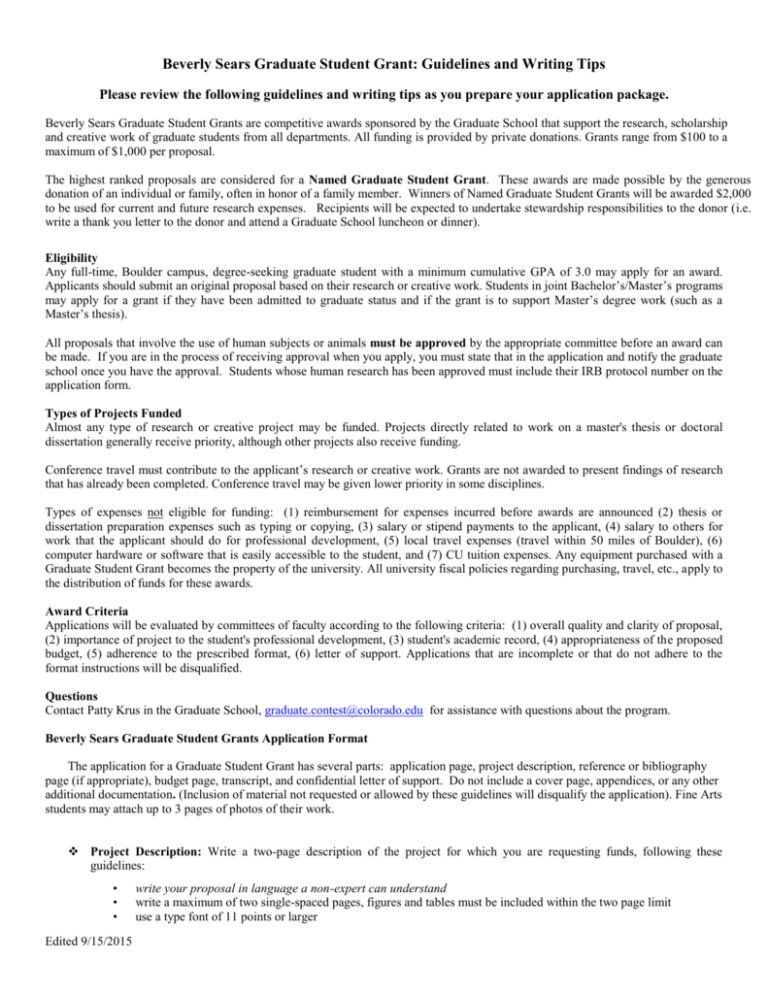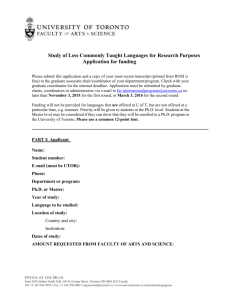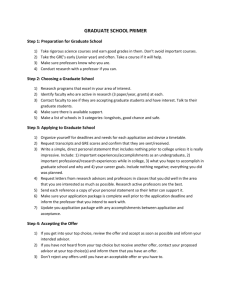Beverly Sears Grant Guidelines and Writing Tips
advertisement

Beverly Sears Graduate Student Grant: Guidelines and Writing Tips Please review the following guidelines and writing tips as you prepare your application package. Beverly Sears Graduate Student Grants are competitive awards sponsored by the Graduate School that support the research, scholarship and creative work of graduate students from all departments. All funding is provided by private donations. Grants range from $100 to a maximum of $1,000 per proposal. The highest ranked proposals are considered for a Named Graduate Student Grant. These awards are made possible by the generous donation of an individual or family, often in honor of a family member. Winners of Named Graduate Student Grants will be awarded $2,000 to be used for current and future research expenses. Recipients will be expected to undertake stewardship responsibilities to the donor (i.e. write a thank you letter to the donor and attend a Graduate School luncheon or dinner). Eligibility Any full-time, Boulder campus, degree-seeking graduate student with a minimum cumulative GPA of 3.0 may apply for an award. Applicants should submit an original proposal based on their research or creative work. Students in joint Bachelor’s/Master’s programs may apply for a grant if they have been admitted to graduate status and if the grant is to support Master’s degree work (such as a Master’s thesis). All proposals that involve the use of human subjects or animals must be approved by the appropriate committee before an award can be made. If you are in the process of receiving approval when you apply, you must state that in the application and notify the graduate school once you have the approval. Students whose human research has been approved must include their IRB protocol number on the application form. Types of Projects Funded Almost any type of research or creative project may be funded. Projects directly related to work on a master's thesis or doctoral dissertation generally receive priority, although other projects also receive funding. Conference travel must contribute to the applicant’s research or creative work. Grants are not awarded to present findings of research that has already been completed. Conference travel may be given lower priority in some disciplines. Types of expenses not eligible for funding: (1) reimbursement for expenses incurred before awards are announced (2) thesis or dissertation preparation expenses such as typing or copying, (3) salary or stipend payments to the applicant, (4) salary to others for work that the applicant should do for professional development, (5) local travel expenses (travel within 50 miles of Boulder), (6) computer hardware or software that is easily accessible to the student, and (7) CU tuition expenses. Any equipment purchased with a Graduate Student Grant becomes the property of the university. All university fiscal policies regarding purchasing, travel, etc., apply to the distribution of funds for these awards. Award Criteria Applications will be evaluated by committees of faculty according to the following criteria: (1) overall quality and clarity of proposal, (2) importance of project to the student's professional development, (3) student's academic record, (4) appropriateness of the proposed budget, (5) adherence to the prescribed format, (6) letter of support. Applications that are incomplete or that do not adhere to the format instructions will be disqualified. Questions Contact Patty Krus in the Graduate School, graduate.contest@colorado.edu for assistance with questions about the program. Beverly Sears Graduate Student Grants Application Format The application for a Graduate Student Grant has several parts: application page, project description, reference or bibliography page (if appropriate), budget page, transcript, and confidential letter of support. Do not include a cover page, appendices, or any other additional documentation. (Inclusion of material not requested or allowed by these guidelines will disqualify the application). Fine Arts students may attach up to 3 pages of photos of their work. Project Description: Write a two-page description of the project for which you are requesting funds, following these guidelines: • • • Edited 9/15/2015 write your proposal in language a non-expert can understand write a maximum of two single-spaced pages, figures and tables must be included within the two page limit use a type font of 11 points or larger • if your proposal requests funds to attend a conference, explain how the conference will materially benefit your thesis or dissertation research Reference or Bibliography Page: Include a reference or bibliography page only for citations of the work of other scholars found in your project description. This page is not included in the two-page maximum limit. Budget Page: Upload an itemize budget request and explain the expenses for which you are requesting funds. Quote specific prices, equipment model numbers, etc. You may request up to a total of $1,000 per proposal. Include information regarding other sources of funding for your project. Transcript: Obtain a current academic transcript (official or unofficial). Transcripts must include the current, active semester. Transcripts may not be sent separately from your proposal. Transcripts downloaded from MYCU INFO will be accepted. Graduate students who are completing their first semester may also submit copies of their undergraduate transcripts. Confidential Letter of Support: Request a confidential letter of support from your advisor or a faculty member familiar with your work. Enter your advisor’s name and email in the space allotted in the application, and they will automatically be prompted to provide your letter. Be sure to tell your advisor that his/her letter must be received by the proposal deadline. The Graduate School will no longer accept letters of support after the posted deadline. It is the student’s responsibility to make sure that all materials have been received by the Graduate School by the deadline. The advisor's letter should address the specific merits of the proposal and the abilities and potential of the student applicant. The advisor should also provide information about other financial support the student is receiving for his/her research. Advisors who are submitting recommendations for more than one student should make clear distinctions between students regarding the merits of each individual’s work. Project Report If you received a Bev Sears Graduate Student Grant during the previous academic year; upload a brief report (if you have not already done so) describing how the funding contributed to the completion of your project. If you received a grant in a prior year and did not submit a report you will not be eligible for funding. http://competitions.colorado.edu/competitions/2011_Bev_Sears_Reports/application.php DEADLINE: Applications must be submitted by posted due date at NOON. Edited 9/15/2015 TIPS FOR WRITING GRADUATE STUDENT GRANT PROPOSALS Make sure your proposal is original, well-written and can be understood by an educated layperson. Ask a friend from outside of your department to read your proposal and explain its significance. Choose a project of limited scope. For example, ask for a grant to fund the data collection phase of your dissertation; don’t ask for $1,000 toward the total expenses of your entire thesis or dissertation work. If your project has a large budget, identify a specific element that can be funded within the limits of this program and that will allow you to move forward with your work. In the first paragraph, state your project’s basic idea or problem, its relationship to your research (thesis, dissertation, and creative work), the amount of funding you are requesting, and what the funds will be used for. Describe the relevance of your project to research in your field or your own creative development. What is unique about your research or creative project; how will it contribute to your field? Describe the methodology you will use to conduct your study. Comment on your own individual skills and experience (such as foreign language skills, if relevant) and how they will contribute to your project. If your project involves access to special collections or interviews with specific people, state that you have received permission to use the collections or to conduct the interviews. If you request funds for conference travel, state how the conference travel will contribute to your research or creative work. Grants are not awarded to present findings of research that has already been completed. Grants are generally not awarded to students who are not presenting their work at the conference or completing a specific element of their research by attending the conference. Use the full two pages to describe your project. Use section heads to organize your proposal rather than writing two pages of straight narrative. Your advisor’s letter of support is very important. Be sure to give him/her enough time and information to write a strong letter. Please make sure your recommenders are aware of your request so they may prepare properly. Advisor letters must be submitted by the deadline. Budget: Reviewers scrutinize the budget page; itemize your expenses and quote specific prices. If you request funds to cover only a portion of your budget, please explain other sources of funding. (Make it clear that your project will be able to be completed.) You may add narrative to your budget page to explain or justify items in your request. Please note: equipment purchased with a Graduate Student Grant becomes the property of the university. Format: Be sure to read and follow submission procedures. The Graduate School cannot accept proposals that are submitted in an incorrect format. In addition, the Graduate School cannot accept proposals from students who do not meet all eligibility requirements at the time of the deadline. DO NOT include additional materials beyond items described by the application format guidelines. All figures and tables included in the proposal must remain within the two-page limit for the project description. Edited 9/15/2015






